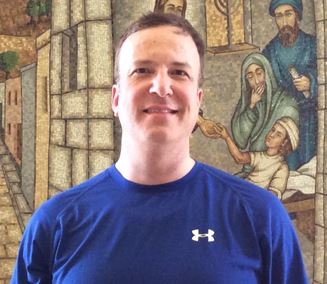 Finding our way back home and into the heart of God
Finding our way back home and into the heart of God
This year’s Lenten theme at Holy Family invites us to take a journey into our hearts; The Return: a radical journey of the heart. From the placement of the pallets in the sanctuary; to the sign post pointing in the three distinct directions of dignity, goodness, and humanity; to the photographs and posters in the back of church with social justice teachings, all of which invite us to be a little more introspective, self-reflective and active in choosing our course in life. Is the direction we are going taking us back home and into the heart of God?
On this third Sunday of Lent, we hear about Moses’ curiosity that makes him want to “get up and go look.” Moses encounters a divine presence in the form of a burning bush. This divine presence is calling him, seeking him, loving him and guiding him home and into the heart of God. Moses’ experience of God reflects back to him the direction he is going. Is the direction he is going offering him hope, filling him with compassion for the world; opening his eyes to a new way of being, a new way of seeing, a new way of living; deepening his relationships; revealing love; and growing him more and more into God’s likeness? If not, he must look again.
After this encounter with God, Moses becomes more honest with himself and able to acknowledge that he has spent too much time making a home in places that were far too temporary, fleeting and passing. Like Moses, the direction of where we are going will determine how we live, how we navigate life, and how we relate to God and our neighbor. We answer the question of where we are going by our choices, decisions, priorities and the relationships we create. Even if we never directly ask ourselves the question of where we are going, we are always answering it. We answer it every minute of every day. Ultimately this question lies at the core of our relationship with God.
In the ancient world, mountaintops were the traditional dwelling places for the divine. There, at the mountain, Moses encountered an unquenchable burning bush that, like a sacramental window, revealed and hid, was dangerous and attractive, frightening and comforting, untamed and reassuring. When Moses was instructed to remove his sandals, God was identifying not only that he was standing on holy ground, but also that Moses had never fully been “home” in any community up until now. He had belonged nowhere. By taking off his sandals, this gesture was associated not only with a worship space, but also of finding his way back home to God. Here, at the foot of the mountain, Moses the “alien,” the “foreigner,” the “refugee,” now found a true “home.” His true home was with God, the God of his ancestors, “the God of Abraham…of Isaac…of Jacob.” The real issue for Moses had been his belonging. He had lost track of how to be in a relationship with God. Moses now learned that no matter who he was, what he had done, what had been done to him, he was a child of God. Even away from home, he belonged to a Father who wanted to help him out of his lost-ness.
These truths about the God of second chances is also reflected in the Gospel of Luke. The story of the fig tree is about the patience of God, the need for more time to grow in our faith and prayer and our relationship with the ‘God of many chances.’ The parable of the fig tree offers a glimpse of hope. The gardener will do what he can to produce fruit from the fig tree, giving it more time and attention. The gardener is confident that if he makes another effort, the fig tree will bear fruit, in spite of appearances. The owner sees only that the barren fig tree is wasting valuable space. But the gardener, who is more an expert in these matters, loves the tree and sees that it may have potential with proper care and nurturing. He wants to give it another chance. The gardener represents God’s compassion for us and activity in our life to make us blossom. Like the fig tree, God is giving us more time to bear fruit. What do we need to become fruitful trees that give of themselves generously to others? Let us turn away from anything that is not of God and ask for help in entering more deeply into the world of goodness and love, of light and of truth.
“Most Holy God, in your holy word we read so many stories about the ones you have protected as they left home in search of a better way of life. Scripture inspires us to strive for greater hospitality to the poor, the weak and strangers. We pray for all dreamers. We pray that they will be allowed to find work, study and live in safety. We pray that those in authority may turn away from prejudice, fear and scarcity, and that they will set their hearts on acts of mercy. We pray that you will give us vision and inspire us in our actions as we seek to realize our goal of liberty and justice for all. In Jesus’ name we pray. Amen.”
Fr. Rich Jakubik